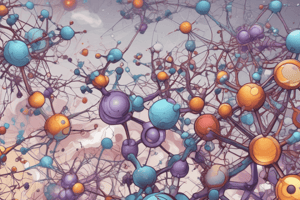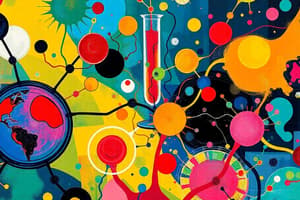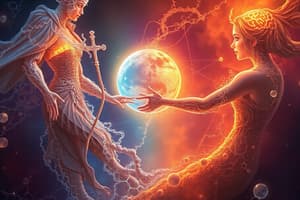Podcast
Questions and Answers
What is the primary function of enzymes in the body?
What is the primary function of enzymes in the body?
- Regulating and maintaining homeostasis (correct)
- Constructing muscle tissue
- Providing energy through oxidation
- Controlling genetic transmission
Which of the following best describes catabolism?
Which of the following best describes catabolism?
- Biosynthesis of complex molecules
- The synthesis of nucleic acids
- The breakdown of biomolecules to release energy (correct)
- Regulation of metabolic pathways
During intermediary metabolism, which process is associated with energy production?
During intermediary metabolism, which process is associated with energy production?
- Glycogen synthesis
- Lipid anabolism
- Oxidative phosphorylation (correct)
- Hemoglobin synthesis
What role do nucleic acids play in the body?
What role do nucleic acids play in the body?
Which metabolic pathway is classified as part of central metabolic pathways?
Which metabolic pathway is classified as part of central metabolic pathways?
What is the outcome of anabolism in metabolic processes?
What is the outcome of anabolism in metabolic processes?
Which factor does NOT influence an organism's energy needs?
Which factor does NOT influence an organism's energy needs?
What is basal metabolism?
What is basal metabolism?
What is the primary focus of structural biochemistry?
What is the primary focus of structural biochemistry?
Which group of bioelements includes oxygen, carbon, nitrogen, hydrogen, calcium, and phosphorus?
Which group of bioelements includes oxygen, carbon, nitrogen, hydrogen, calcium, and phosphorus?
Which of the following best describes metabolic biochemistry?
Which of the following best describes metabolic biochemistry?
What role does clinical biochemistry play in the medical field?
What role does clinical biochemistry play in the medical field?
What function of bioelements is primarily associated with maintaining the balance of fluids in the body?
What function of bioelements is primarily associated with maintaining the balance of fluids in the body?
What distinguishes inorganic components within the human body?
What distinguishes inorganic components within the human body?
Which of the following represents a source of daily water intake?
Which of the following represents a source of daily water intake?
Which branch of biochemistry is focused on enzyme modulation and drug action?
Which branch of biochemistry is focused on enzyme modulation and drug action?
Which biomolecules primarily serve energy and structural roles?
Which biomolecules primarily serve energy and structural roles?
Which statement accurately describes the percentage of body mass constituted by water in adults?
Which statement accurately describes the percentage of body mass constituted by water in adults?
What process does metabolic biochemistry encompass regarding complex biomolecules?
What process does metabolic biochemistry encompass regarding complex biomolecules?
How can clinical biochemistry assist in monitoring disease progression?
How can clinical biochemistry assist in monitoring disease progression?
Which mineral salts are essential for numerous bodily functions?
Which mineral salts are essential for numerous bodily functions?
The body's water balance is maintained with fluctuations of less than what percentage of body weight?
The body's water balance is maintained with fluctuations of less than what percentage of body weight?
Which aspect of metabolism is categorized as catabolic?
Which aspect of metabolism is categorized as catabolic?
What role do proteins primarily serve among biomolecules?
What role do proteins primarily serve among biomolecules?
Flashcards are hidden until you start studying
Study Notes
Definition of Biochemistry
- Biochemistry studies the chemical composition of living things and the chemical reactions occurring within them.
- It encompasses multiple disciplines like organic chemistry, analytical chemistry, physical chemistry, cell biology, physiology, and genetics.
Fields of Biochemistry
- Structural Biochemistry: Focuses on the chemical composition of living organisms and the properties of isolated biological molecules.
- Metabolic Biochemistry: Examines the chemical reactions within the organism, including anabolism (biosynthesis) and catabolism (breakdown).
- Functional Biochemistry: Investigates the chemical processes underlying vital activities like cellular respiration, enzyme activity, muscle contraction, and signal transmission.
- Clinical Biochemistry: Interprets laboratory test results for diagnosis and treatment in medical practice.
Major Components of the Human Body
- The human body is comprised of inorganic and organic components.
- The fundamental unit of life is the cell, containing essential components for survival and continuity.
- Organisms are "open systems," requiring energy for metabolic processes, crucial for survival.
Inorganic Components of the Human Body
- Essential Bioelements:
- Nonmetals: Oxygen (O), Carbon (C), Hydrogen (H), Nitrogen (N), Phosphorus (P), Sulfur (S)
- Elements: Sodium (Na), Potassium (K), Calcium (Ca), Magnesium (Mg), Chlorine (Cl), Iron (Fe)
- Distribution of Bioelements:
- Oxygen, carbon, hydrogen, and nitrogen make up 96% of cell mass.
- Macroelements: O, C, N, H, Ca, P
- Oligoelements: Na, K, Cl, S, Mg, Fe
- Microelements: Zn, Mn, Co, Cu, F, B, I
- Ultramicroelements: Li, Al, Si, Cd, Cr, Ni
- Functions of Bioelements:
- Bioelectric: Nerve impulse transmission
- Osmotic: Maintaining fluid balance
- Structural: Building tissues and organs
- Regulatory: Hormonal and enzymatic processes
- Mechanical: Bone structure and muscle contraction
- Energy: ATP production
Water
- Water constitutes 60-70% of body mass.
- Percentage varies with age, sex, tissue metabolism, and body composition.
- Daily intake is through external fluids, food, and metabolic processes.
- Body maintains water balance with precise regulation mechanisms.
- Water is excreted through kidneys, lungs, intestines, and skin.
- Biological Roles of Water:
- Dissolution and stabilization of molecules and ions.
- Thermal balance control.
- Transport of nutrients and waste removal.
- Mechanical function: lubrication and shock absorption.
- Structural role: cell shape and tissue integrity.
- Catabolic role: participating in chemical reactions.
- Maintenance of acid-base balance.
Mineral Salts
- Essential for body function.
- Examples: chlorides, phosphates, sulfates, and carbonates of sodium, potassium, calcium, and magnesium.
Organic Components of the Human Body: Biomolecules
- Biomolecules comprise the organic molecules composing living matter.
- They contribute to the biochemical, structural, and functional organization of organisms.
- Categories of Biomolecules:
- Energy & Structure: Carbohydrates and lipids.
- Structural: Proteins.
- Informational: Nucleic acids (DNA and RNA).
- Regulatory: Enzymes, vitamins, and hormones.
- Importance of Biomolecules:
- Carbohydrates and lipids provide energy.
- Proteins provide structure and facilitate chemical reactions.
- Nucleic acids control genetic inheritance.
- Enzymes, vitamins, and hormones regulate and maintain homeostasis.
Intermediary Metabolism
- A complex process involving catabolism (breakdown) and anabolism (synthesis).
- It is a balanced process that ensures energy acquisition and synthesis of new compounds.
- Metabolic Pathways:
- Central or Common Pathways:
- Glycolysis
- Krebs Cycle (Citric Acid Cycle)
- Pentose Phosphate Pathway
- Oxidative Phosphorylation
- Specific Metabolic Pathways: Examples include hemoglobin synthesis, glycogen synthesis/degradation, lipid metabolism
- Central or Common Pathways:
- Metabolic Roles:
- Energy Production
- Biomolecule Synthesis and Degradation Synchronization
- Precursor Production for Macromolecular Synthesis
- Maintaining Metabolic Homeostasis
Catabolism and Anabolism
- Catabolism: Breakdown of nutrients into simpler molecules (lactic acid, pyruvic acid, acetyl-CoA, CO2, ammonia, urea).
- Involves carbohydrates, lipids, and proteins.
- Oxidative reactions, releasing energy in the form of ATP.
- Anabolism: Biosynthesis of complex molecules from simple ones (carbohydrates, lipids, proteins, nucleic acids).
Regulation of metabolism:
- Gentle mechanisms: feedback inhibition
- Allosteric mechanisms: binding of a molecule to a site other than the active site to change enzyme activity.
The Fundamental Role of Food in Human Health
- Nutrition: Provides energy and essential nutrients for biosynthesis, body temperature maintenance, and physical activities.
- Energy needs vary with growth, development, and age.
- Basal metabolism: energy consumption for basic functions at rest (~1000 kcal/day/m2 of body surface).
Studying That Suits You
Use AI to generate personalized quizzes and flashcards to suit your learning preferences.




